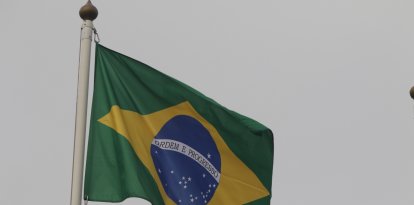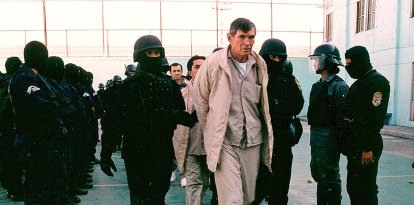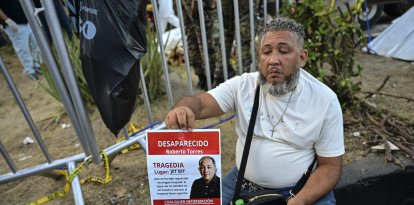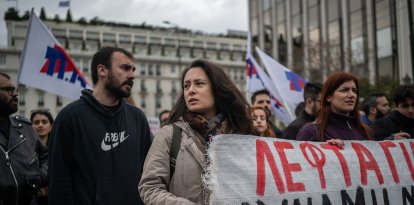World freedom was on the decline in 2023
The valuation of political and civil rights fell in 52 countries in 2023 and improved in only 21, according to Freedom House.
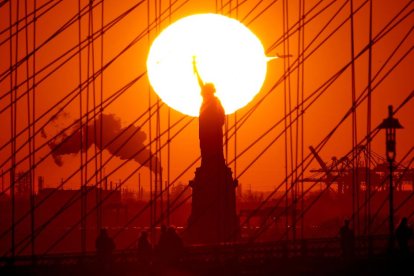
(CHARLY TRIBALLEAU / AFP)
Corruption, lack of transparency, tyranny - including coups d'état, - wars, civil conflicts and crime are some of the aspects that indicate that democracies and regimes are suffering around the world. According to an annual report by the non-governmental organization Freedom House, political rights and civil liberties fell in 52 countries in 2023, while only 21 nations made improvements compared to the previous year.
Freedom House values civil liberties on a scale of 0-60, while political rights are scored on a scale of 0-40.
It is the 18th consecutive year in which civil liberties and political rights have been on the decline. The last time more nations were better off than before was in 2005. In 2023, there were more than twice as many countries on the decline than those that improved. "The scope and scale deterioration were extensive," said Yana Gorokhovskaia, one of the report's authors.
The United States has the same score as in 2022
Civil liberties and political rights in the United States barely changed from 2022 to 2023. The first decreased by one point - going from having a rating of 51 to 50 out of 60 points, while the second had a slight improvement - from 32 to 33 out of 40. The overall count is similar from one year to the next (83/100), although it is true that its valuation fell over time. In 2021, it also had a score of 83/100; but in 2020, 2019 and 2018 it was 86/100. Six years ago, in 2017, it was 89/100.
Freedom House points out that the United States' failure to improve its score lies with its institutions, which "have suffered erosion, as reflected in rising political polarization and extremism, partisan pressure on the electoral process, mistreatment and dysfunction in the criminal justice and immigration systems, and growing disparities in wealth, economic opportunity, and political influence." Despite this, it maintains its status as a "free" country.
Dictatorships and crime plague Latin America
The United States is not the country with the best overall score in the Americas. Ahead are Canada (97), Uruguay (96), Chile (94), Costa Rica (91), Belize (87) and Argentina (85), in addition to the island countries of the Caribbean - such as Barbados (94). Panama (83), which has the same rating as the United States, Jamaica (80), Suriname (79), Guyana (73) and Brazil (72) are also part of the list of American countries with "free" status.
On the other side of the scale, there are four countries governed by dictators that are considered "not free." These are Haiti (30), Nicaragua (16), Venezuela (15) and finally Cuba (12). In this quartet, corruption, tyranny and the lack of transparency and impartiality prevail in the legislative institutions, in the government and the judicial bodies, in addition to the violence that is present daily on the streets.
According to the report, six out of ten Americans believe that they live in freedom, while 6% think otherwise.
Europe, the freest region despite the decrease in 14 countries
Finland is the most "free" country in the world, its score is unbeatable: 100/100. The rest of the Scandinavian countries (Sweden, 99; Norway, 98; and Denmark, 97) also have an outstanding rating. Ireland was also given a rating of 97, alongside the Netherlands 97, Iceland 94, Belgium 96, Germany 93 and the United Kingdom 91. The middle of the continent is just as promising with Switzerland (96), the Czech Republic (94) and Austria (93). Although the south is somewhat lower, the scores are still outstanding: Portugal (96), Spain (90), Italy (90) and Greece (85). In the east, Montenegro (69), Serbia (57) and Bosnia (51) fail to earn the "free" country status and are considered "partially free."
The contrast is found in Turkey (33), Russia (13) and Belarus (8); the only three "non-free" countries in Europe. They are part of the region known as Eurasia.
Although 82% of citizens residing in Europe believe that they live in "free" countries, while 14% believe that they live in "not free" countries, civil liberties and political rights fell in 14 nations and only increased in six. This decline is the result of institutional management, political corruption and the absence of transparency.
Israel is a free country; Syria is the least free nation in Asia
The conflict started by the terrorist group Hamas penalized Israel, registering a drop in its rating of three points (from 77 to 74). Despite this, it remains one of the few Asian countries with "free" status - along with Mongolia, Japan, South Korea and Taiwan. New Zealand (99) and Australia (95) are "free" countries within the Pacific region.
On the other hand, Syria was given one point. Other countries with significant geopolitical influence on the Asian continent are also considered "not free." They include (11), China (9), Saudi Arabia (8) and North Korea (3).
In the Asia-Pacific region, only five out of every 100 inhabitants believe they live in a free country, while 39% believe the opposite. The lack of civil rights, conflicts and the absence of democratic transparency are the great obstacles for Asian nations.
Only nine African countries have "free" status
Cape Verde has the best record (92) of civil liberties and political rights on the entire African continent. The island country joins Seychelles, Ghana, Sao Tome and Principe, South Africa, Lesotho, Botswana, Mauritius and Namibia on the list of "free" nations.
The rest of the nations are listed as "not free," with some exceptions such as Senegal, Liberia, Kenya and Benin. The worst score is for South Sudan (1), accompanied by Eritrea (3), Equatorial Guinea (5) and the Central African Republic (5). Only 7% of the population believes that they live in a "free" country. The big problems that Africa faces are related to electoral manipulation, the tyrants who govern and the civil violence that rages in the streets.
RECOMMENDATION

